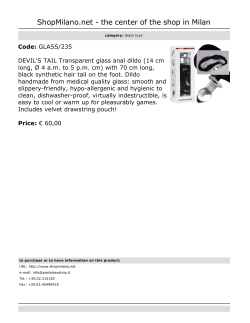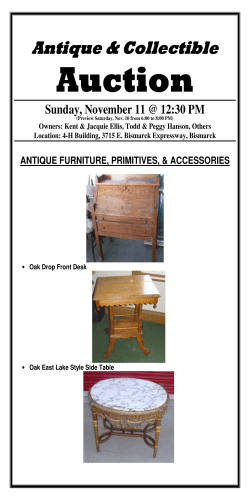
Scratched Glass MWCoA Seminar
PWC ISSUE 5 NEW IMAGES2 18/12/05 13:31 Page 11 Scratched Glass MWCoA Seminar Scratched glass is becoming more of an issue for window cleaners everywhere. It’s a problem that U.S. window cleaners have been battling for some time now, and it’s coming to Britain. The issue of scratched glass and fabricating debris is perhaps one that many UK window cleaners will not be all that familiar with. However, it is a hot-topic in the USA, and all the indications are that it is set to become just as important for UK window cleaners, especially those who frequently perform builders cleans. So, what is the problem with scratched glass, and why should window cleaners know about it? Who’s To Blame? Glass may become scratched at many different stages in the construction process. Sometimes construction workers place their tools on windows, painters and plasterers may try to remove spatters by ‘dry scraping’, and sometimes just not enough protection is given to the pane during installation. However, a contentious issue arises when apparently scratch-free glass is left marked after a window cleaner has used a metal scraper to clean it. Do Metal Scrapers Cause Scratches? In a word, No. But unfortunately it isn’t quite as simple as that. Nearly all window cleaners have used a metal Friend or Foe? Metal scrapers are often (wrongly) blamed for scratches, especially for construction cleans scraper at some point to remove stubborn marks on windows, and of course have found that they do not cause scratches to appear. However, in certain circumstances, using a metal scraper on new glass may dislodge microscopic pieces of glass debris (or “Fines”) that are left behind during the tempering process. If these are dragged across the surface of the glass by the scraper, severe scratching may result. The question of liability in such circumstances is a controversial one. Is the window cleaner to blame? Or are the glass manufacturers at fault? As the cost of replacing or repairing scratched glass can be very high, this is an important question. MWCoA Seminar This issue is such a hot-potato that U.S. trade association The Master Window Cleaners of America held a seminar to help educate its members about the problem, and how to avoid it in the first place. PWC would like to thank MWCoA Executive Director Jack Nelson for contributing the following article on the subject. The cause of “Comet” scratches like those shown above is almost always as a result of fabricating debris (the comet’s head) broken and trapped by the scraper, creating the comet’s ‘tail’ 10 For more information on scratched glass, visit: www.stopscratchedglass.com www.scratchedglass.net www.professionalwindowcleaner.co.uk PWC ISSUE 5 NEW IMAGES2 18/12/05 13:31 Page 12 MWCoA Seminar : Scratched Glass PWC Dan Fields (Fields Construction Services Inc) presented the seminar on Fabricating Debris & Scratched Glass Fabricating Debris & Scratched Glass Seminar by Jack Nelson, Master Window Cleaners of America “I must be dreaming” This is the thought that first entered my mind on two occasions when I stepped into the window cleaning Mecca that is the Ettore factory, and Dan Field's Construction Company in Oakland, California in October 2005. I embarked on a 3,000 mile journey via air to be treated to all of the latest and greatest advancements in the business. I also had the privilege of meeting some of the finest professionals in the business. Members of Master Window Cleaners of America (MWCoA) were treated to a tour of the Ettore plant by the CEO Michael Smahlic. The tour began in a conference room just outside of Smahlic's office. He showed us the 1st squeegee ever made. He also shared the story of how his father-in-law won a hat from J. Racenstein on a bet. If you go to the Ettore website, it really is an interesting story. A tour of the plant followed. We watched as rubber was cut, squeegees were assembled, and everything was shined and boxed. It's a very smooth operation. At the end of the tour, no one wanted to leave, but the factory had already shut down and we were the last to be leaving for the day. So it was off to the hotel. We talked window cleaning non stop from the time we got together for breakfast until we parted to our rooms for the night. Dan Fields presented the seminar. I have always been impressed with the wisdom and knowledge he exudes. You should see his operation! He employs 65 window cleaners and has about 30 vans and www.professionalwindowcleaner.co.uk 11 PWC ISSUE 5 NEW IMAGES2 PWC 18/12/05 Page 13 MWCoA Seminar : Scratched Glass trucks running each day, has a 10,000 square foot office building and they clean 4,500 new homes each year. If you ever need to know anything about windows, for certain, Dan is the man to ask. A seminar about window cleaning is a learning experience, but the learning does not stop when the seminar ends. In as much as a seminar is a learning experience, it is also a get together for people who love their profession. Many experiences are shared, techniques exchanged, adaptations of equipment and supplies shared and perhaps most rewarding the bonds formed among window cleaners. The seminars covered Construction Clean Up (CCU), Water Spot Removal and Tempered Glass Defects. The seminar began with CCU information. This is the first cleaning that the windows receive after the painters, plasterers or drywall workers have completed the jobs. Dan Fields covered every aspect from wetting the glass with a window brush to scraping the glass with a broad knife. A broad knife, is a 6" putty knife or tape knife (used for dry wall repairs) that is sharpened on a 12" fine file. The broad knife is not sharpened like a razor, but the tip is pushed across the file giving you a flat surface with 2 sharp edges. If you visit StopScratchedGlass.com you will read that Fields has proven that razors or broad knifes do not scratch glass but that Fabricating Debris left over from the tempering process causes the scratches on most new windows. 12 13:31 Jack Nelson presents Dan Fields with an Appreciation Award for conducting the seminar to MWCoA members. Construction Clean Up can be very profitable. Many companies charge 2 or 3 times the regular windowcleaning price. To clean the windows properly, CCU does take longer. As I mentioned earlier, here in the United States, we are dealing with a good bit of Fabricating Debris on the glass. The problem is wide spread and is due to poor quality tempered glass. Because of this, MWCoA is encouraging everyone doing CCU to get a waiver signed releasing the window cleaner from responsibility for any scratches on the glass. Below is an example of what such a waiver would look like. From ProClean Window Cleaning Company to Builder: Tempered Glass Waiver to XYZ Building Co. Releasing Window Cleaner From Any Liability On Tempered Glass Scratching During Cleaning Due to widespread problems with poor quality tempered glass scratching during construction window cleaning ProClean Window Cleaning will not be liable for any scratches on any tempered glass. It is accepted and understood by ALL parties that properly used razor blades and scrapers are standard tools and techniques for construction window cleaning and can safely remove limited amounts of construction debris (plaster, paint, texture, tape, stickers, etc) from quality glass, without scratching the glass surface. Furthermore, it is accepted, the use of razor blades and scrapers will be employed on all construction window cleaning and no other cleaning method will be offered by ProClean Window Cleaning to remove construction debris from any glass surface. If XYZ Building does not choose to have the window cleaner use razor blades or scrapers, XYZ Building must cover all glass during the entire construction process, which would protect glass from any construction debris and eliminate the need for ProClean Window Cleaning to use razor blades or scrapers to clean the glass. This clause must be included on all contracts. If this clause is not acceptable, there is no contract between ProClean Window Cleaning and XYZ Building Co. Please initial acceptance of this clause; ________ A typical waiver releasing the window cleaning company from responsibility for any scratches on the glass during Construction Clean Up (CCU) www.professionalwindowcleaner.co.uk PWC ISSUE 5 NEW IMAGES2 18/12/05 13:31 Page 14 MWCoA Seminar : Scratched Glass Each member who attended the seminar received a certificate PWC This water can be removed easily with a solution of Phosphoric acid or vinegar. Another hard water spot is caused by Silicate. This type of stain can only be removed by Hydrofluoric acid or polishing the spot off the glass using a polishing system. Glass corrosion occurs mostly between IG units (Insulated Glass). The corrosion looks more like bacteria growing between the units often turning a shade of white. There is very little hope to save the glass once the seal is broken. Professional window cleaners use scrapers and razors on a daily basis without scratching the glass. I remember the first time I scratched glass. I didn't understand then what had happened, but I knew it wasn't anything that I had done. It had to be the glass that was defective. Fields has spent many years uncovering the problem. Several window cleaners across the United States have been either sued or threatened with litigation. Fields has gone to bat for many of these window cleaners, and has never lost a case as an expert witness. We took a break for lunch. You would think, we would relax and enjoy the food that was provided for us, but no. We talked more about window cleaning techniques for an hour. Several of the guys sat around and picked Dan's brain for more information. The second part of the day covered Water Spot Removal. This is a very complicated subject but Dan’s illustrations through pictures and actual demonstrations, made it very understandable. All glass produced in the United States is float glass. One side of the glass is called the tin surface, the other is the air surface. The tin surface is face down and floats on molten tin. During the float process 25-30 milligrams of tin migrates into the surface of the float glass. Types of Glass Stain There are three basic types of stain on glass; Water Spots, Glass Corrosion and Tin Etch Haze. I will try to explain each of them. Water spots are caused by hard water (composed of magnesium and calcium) and look like water droplets on the glass. The water spot is often on the exterior of the glass. www.professionalwindowcleaner.co.uk Tin Etch Haze is the last type of glass stain. Often the tin side is faced inside most IG units. The exception is if a film is used such as low-e or pyloric coatings (mirror type films). These films need to be placed on smooth glass. The smooth side is the air side. Tin Etch Haze will occur when HF (hydrofluoric acid) is used on the tin side (for the removal of other stains). To avoid this problem, an ultra violet light can be used to distinguish the two sides. The light will reflect grey on the tin side and have a crisp cleaner reflection on the air side. Tempered Glass Defects The final seminar of the day dealt with Tempered Glass Defects. This seminar was fairly simple and easy to understand. Glass temperatures create the problem of Fabricating Debris by not cleaning the glass properly before the tempering process. The window manufacturer tempers the glass by heating the glass to 1200 degrees F. This process does two things; It causes the glass to become 13 PWC ISSUE 5 NEW IMAGES2 PWC 18/12/05 13:31 Page 15 MWCoA Seminar : Scratched Glass Fabricating debris is difficult to detect and only occurs on tempered glass. Look for the temper stamp on the glass. In the US the glass is labelled in two different ways. Sand blasted from the furnace roller side (the side the defects would be on) or a ceramic paint stencil is applied to the opposite side of the furnace rollers (the air side). The sand blasted label would be smooth or slightly indented to the touch. The ceramic stencil would be raised to the touch. This way you would know what side might have fabricating debris. Fabricating debris can be detected by the following test: 4 to 5 times stronger than annealed glass. Also tempered glass breaks into smaller pieces if it should shatter. Here is basically what happens: It all starts with the glass washer and the lack of maintenance to that washer. If the glass washer is not properly maintained, fabricating debris will remain on the glass after the glass exits the washer. When the glass and any remaining fabricating debris enters the tempering furnace, the 1200 degree furnace fuses the fabricating debris to the roller side surface of the glass and the furnace rollers. It's this fabricating debris that causes the scratching on tempered glass. When a window cleaner removes construction debris from the glass surface, they also remove the defects, which scratch the glass when they are moved across the glass surface. Also, over time the tempering furnace also becomes contaminated with fabricating debris and must be serviced to remove fabricating debris from the surface rollers. A. Wetting the glass with soapy water B. With a new razor blade (moving only in one direction) make several long strokes across the glass and listen for anything that sounds like there is sand or grit on the surface. If debris is detected notify the contractor right away to let him know about your findings. Although the air travel was miserable for me, but even a six hour flight complete with screaming babies, fellow passengers’ smelly feet, boring movies, no room to stretch and no sleep on my "red eye" trip home were not able to dampen my enthusiasm. This was an adventure I would not have traded for the world. The seminars were professionally video taped and will be available for sale in the near future. See our site for details www.mwcoa.com You can find more information from Dan Fields by going to www.StopScratchedGlass.com Jack Nelson is the executive director of The Master Window Cleaners of America. The MWCoA is a trade association formed primarily to represent residential or route window cleaners. Since it’s foundation it has gained more than 100 members, and is going from strength to strength. For more information about the MWCoA, see: www.mwcoa.com 14 www.professionalwindowcleaner.co.uk PWC ISSUE 5 NEW IMAGES2 18/12/05 13:32 Page 16 MWCoA Seminar : Scratched Glass PWC Dan Fields’ Website (www.stopscratchedglass.com) contains much useful information on fabricating debris,what causes scratched glass, and most importantly how to prevent it. www.professionalwindowcleaner.co.uk 15
© Copyright 2026








